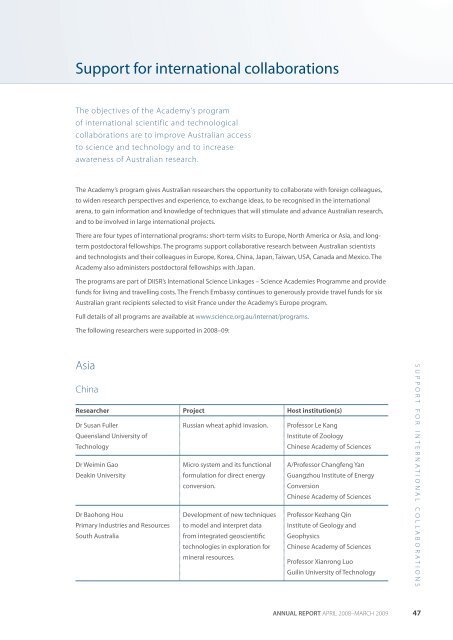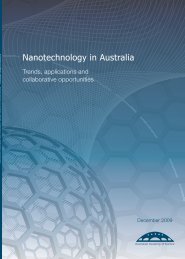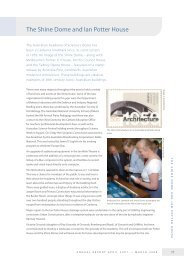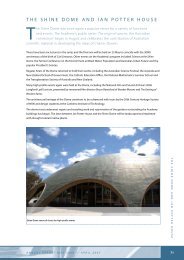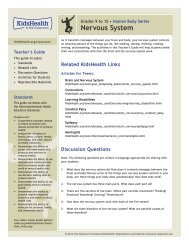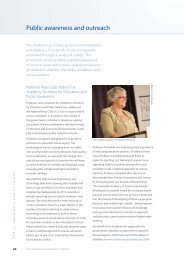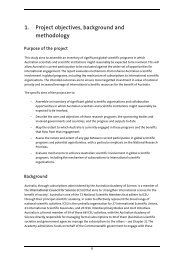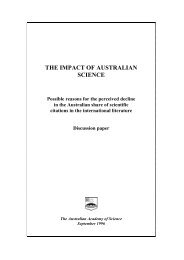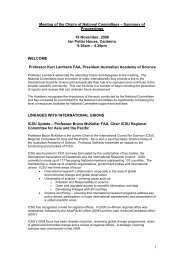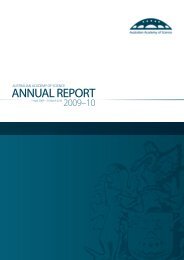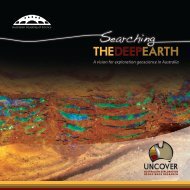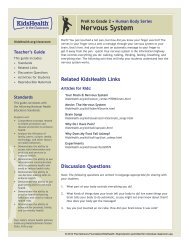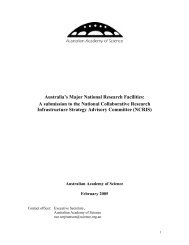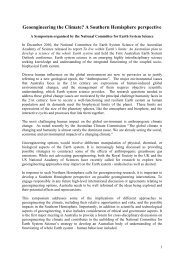full report - Australian Academy of Science
full report - Australian Academy of Science
full report - Australian Academy of Science
Create successful ePaper yourself
Turn your PDF publications into a flip-book with our unique Google optimized e-Paper software.
Support for international collaborations<br />
The objectives <strong>of</strong> the <strong>Academy</strong>’s program<br />
<strong>of</strong> international scientific and technological<br />
collaborations are to improve <strong>Australian</strong> access<br />
to science and technology and to increase<br />
awareness <strong>of</strong> <strong>Australian</strong> research.<br />
The <strong>Academy</strong>’s program gives <strong>Australian</strong> researchers the opportunity to collaborate with foreign colleagues,<br />
to widen research perspectives and experience, to exchange ideas, to be recognised in the international<br />
arena, to gain information and knowledge <strong>of</strong> techniques that will stimulate and advance <strong>Australian</strong> research,<br />
and to be involved in large international projects.<br />
There are four types <strong>of</strong> international programs: short-term visits to Europe, North America or Asia, and longterm<br />
postdoctoral fellowships. The programs support collaborative research between <strong>Australian</strong> scientists<br />
and technologists and their colleagues in Europe, Korea, China, Japan, Taiwan, USA, Canada and Mexico. The<br />
<strong>Academy</strong> also administers postdoctoral fellowships with Japan.<br />
The programs are part <strong>of</strong> DIISR’s International <strong>Science</strong> Linkages – <strong>Science</strong> Academies Programme and provide<br />
funds for living and travelling costs. The French Embassy continues to generously provide travel funds for six<br />
<strong>Australian</strong> grant recipients selected to visit France under the <strong>Academy</strong>’s Europe program.<br />
Full details <strong>of</strong> all programs are available at www.science.org.au/internat/programs.<br />
The following researchers were supported in 2008–09:<br />
Asia<br />
China<br />
Researcher Project Host institution(s)<br />
Dr Susan Fuller<br />
Queensland University <strong>of</strong><br />
Technology<br />
Russian wheat aphid invasion. Pr<strong>of</strong>essor Le Kang<br />
Institute <strong>of</strong> Zoology<br />
Chinese <strong>Academy</strong> <strong>of</strong> <strong>Science</strong>s<br />
Dr Weimin Gao<br />
Deakin University<br />
Micro system and its functional<br />
formulation for direct energy<br />
conversion.<br />
A/Pr<strong>of</strong>essor Changfeng Yan<br />
Guangzhou Institute <strong>of</strong> Energy<br />
Conversion<br />
Chinese <strong>Academy</strong> <strong>of</strong> <strong>Science</strong>s<br />
Dr Baohong Hou<br />
Primary Industries and Resources<br />
South Australia<br />
Development <strong>of</strong> new techniques<br />
to model and interpret data<br />
from integrated geoscientific<br />
technologies in exploration for<br />
mineral resources.<br />
Pr<strong>of</strong>essor Kezhang Qin<br />
Institute <strong>of</strong> Geology and<br />
Geophysics<br />
Chinese <strong>Academy</strong> <strong>of</strong> <strong>Science</strong>s<br />
Pr<strong>of</strong>essor Xianrong Luo<br />
Guilin University <strong>of</strong> Technology<br />
SUPPORT FOR INTERNATIONAL COLLABORATIONS<br />
ANNUAL REPORT APRIL 2008–MARCH 2009 47


